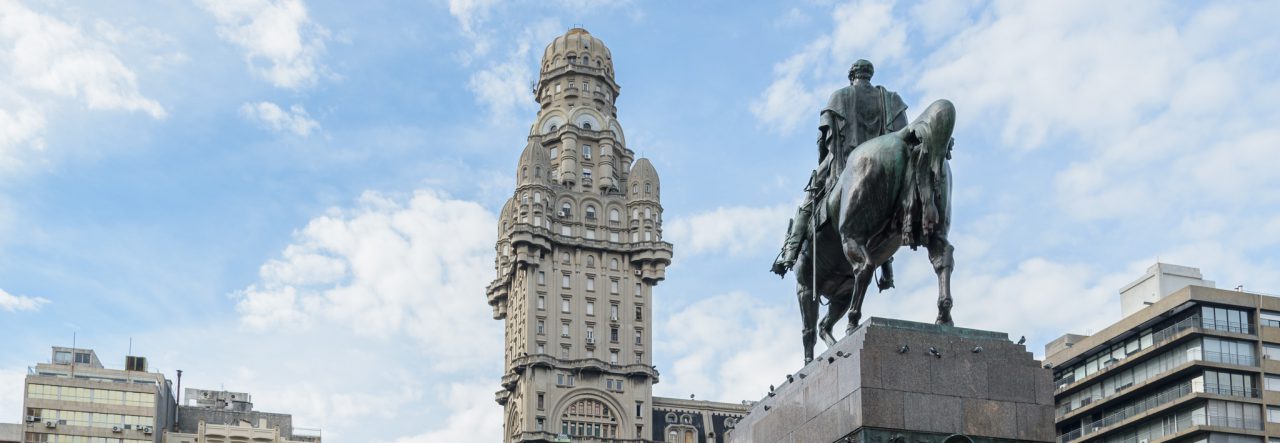The Spanish airline Cosmo offered $137 million USD for seven bombardier jets wining the Pluna liquidation auction. However, Uruguay’s air connections remain uncertain.

In a surprise twist, a Spanish company bought seven airplanes which had belonged to Uruguay’s now bankrupt flag carrier Pluna for $137 million USD. The government has not released information about the company’s record and for the moment many of Pluna’s former air routes remain unserviced.
Ten minutes after 2pm a man in a black suit and light blue tie appeared outside the door of the Rural del Prado asking about the auction of seven jet planes belonging to Pluna. Since the doors were closed the man, who identified himself as a “bidder” had to wait. After another 12 minutes, the man returned but was again told to wait. The mystery bidder (who appears to have been the only bidder), turned out to be a Spaniard named Antonio Sánchez. He told the Uruguayan newspaper El País that he represented a Spanish company called Cosmo Líneas Aéreas, which has its headquarters in Madrid and has flights to Lithuania and Iceland.
When asked about Cosmo’s interest in establishing a base in Uruguay, Sánchez responded: “we have no base in Uruguay, our base is in Europe”.
At 2:30 pm press were allowed to enter and the invitees began to enter among them the Canadian ambassador, Sergio Bañales the president of the Uruguayan Association of Travel Agencies, and deputies Jorge Pozzi (Nuevo Espacio) and Daniel Caggiani (MPP).
The last to arrive and officially the only one to pay the $13 million bank guarantee, was Mr. Sánchez. To the surprise of everyone present, 5 minutes into the bidding Sánchez offered $137 million USD. Expected bidders Buquebus, Sol, Venezuela’s state airline Conviasa, and an air taxi company owned by Argentinean Franco Macri were all uninterested in the auction.
“The offer is for $137 million USD and since there is no other offer we can proceed with the sale. However, we are going to wait, we know this is a very special auction” said Mario Stefanoli the auctioneer. At 3:37 PM the gavel sounded and the auctioneer called out “sold”.
Cosmo, on which the Uruguayan government had almost no information, walked away the auction’s winner. The Spanish company now has 30 days to pay the remaining $123.4 million USD and formalize the sale. The amount must be paid in cash. If the government doesn’t receive the rest in time Cosmo must forfeit its $13.6 million USD bank guarantee.
In addition to the $137 million USD Cosmo owes for the purchase, they will have to pay the cost of the auction: .05% of the total sale plus VAT tax.
The money Uruguay obtained at the auction will be used to pay the government’s $136.8 million USD debt to Scotiabank. Uruguay guaranteed Pluna’s original purchase of the 7 jets and was left with the debt when Pluna went bankrupt.
Cosmo has the right to use the airplanes “in whatever way suits their interests” and has no obligations of any kind to Pluna’s former employees (the government removed terms it had planned to place on all bidders). They also do not assume Pluna’s debt to Ancap ($28 million USD) or Banco Republica ($16 million USD).
Uruguay may be left without air connections
The final destination of Cosmo’s new jets continues to be a mystery. However, Uruguay’s government did not require them to remain in Uruguay and Sánchez’s statements indicate that they will end up in Spain.
Sergio Bañales the president of the Uruguayan Association of Travel Agencies said that Sánchez did not rule out at least one of the airplanes remaining in Uruguay to do “some type of operation”. Regardless, since Cosmo is a charter airline even if a plane remains in Uruguay it will have little effect on the country’s air connections.
During a post-auction press conference, the head of the trust overseeing Pluna’s liquidation, Javier Liberman, said he did not know Cosmo’s business plan and if the airplanes would be transferred to Europe. “In the auction’s requirements we asked for bidders to present a guarantee, which [Cosmo] presented on time and correctly, but we did not ask for a business plan to determine the winner of the auction”, Liberman explained.
The trustee did not want to report if other bidders deposited financial guarantee to participate in the auction. “We will not reveal this information [yet]. In another stage we will make public what is in the minutes”, said Liberman.
Cosmo Airlines
Cosmo was not one of the airlines the government was hoping would purchase the airplanes. During transportation minister Enrique Pintado’s post-auction press conference, he did not provide details on Cosmo or take questions from reporters.
Unlike Pintado, Mr. Bañales said he knew Cosmo and that “its focused on charter airplanes and works principally in Northern Europe… I have dealt with them through some business they shared with an Uruguayan company. [Cosmo] is a very serious company. I have been in contact with Antonio Álvarez” (Cosmo’s principal shareholder).
Uruguay’s air lane rights?
Cosmo has 30 days to negotiate with the government for the exclusive rights to Pluna’s old lanes. If Cosmo has no interest in moving into Uruguay, the government will be free to give these rights to whoever.
Politcal sources told the Uruguayan newspaper El País that the government can negotiate the sale of six other Pluna airplanes (currently being leased) to another company. These planes are more modern than the ones auctioned yesterday. Pluna had acquired them in 2010.
This Uruguay Business Reports article is a translation of a news article by Valeria Gil that appeared in the Uruguayan newspaper El País. The original article is available in Spanish here. Uruguay Business Reports translation by Donovan Carberry.







